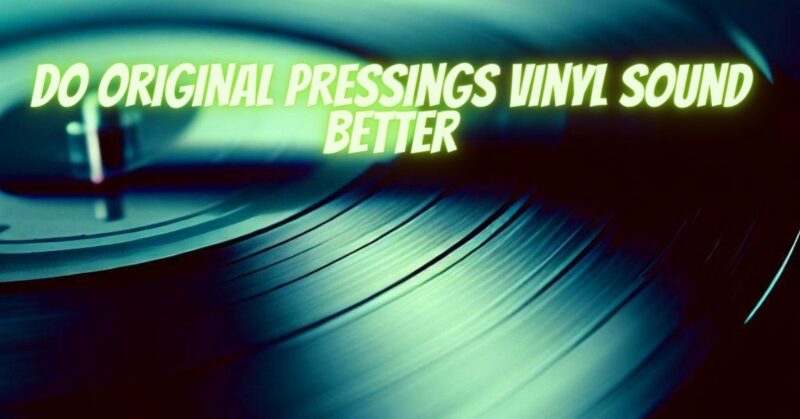For vinyl enthusiasts and audiophiles, the allure of original pressings of vinyl records is undeniable. These vintage editions hold a sense of history and authenticity, prompting debates about whether they truly sound better than reissues or newer pressings. In this article, we will explore the factors that contribute to the perceived sound quality of original pressings and discuss whether they indeed offer a superior audio experience.
What are Original Pressings?
Original pressings refer to the initial production runs of vinyl records when they were first released. These records were pressed using the master tapes, stampers, and equipment available at the time. Original pressings often carry unique characteristics, including matrix numbers, labels, and cover art that differ from subsequent reissues.
Factors Contributing to Sound Quality:
The perceived sound quality of a vinyl record can be influenced by various factors, including:
- Mastering: The mastering process plays a critical role in shaping the sound of a vinyl record. Original pressings were often mastered with the technology and techniques available during their era, which can affect their sonic signature.
- Vinyl Quality: The quality of the vinyl used in original pressings may vary from that used in later reissues. High-quality vinyl can contribute to improved sound clarity and reduced surface noise.
- Pressing Quality: The craftsmanship and care taken during the pressing process can impact the sound quality. Original pressings were often produced in smaller quantities, allowing for more meticulous quality control.
- Analog vs. Digital: Original pressings were typically produced entirely in the analog domain, from recording to mastering to pressing. Some argue that this all-analog process contributes to a warmer and more organic sound.
Perceived Sound Quality of Original Pressings:
The perceived sound quality of original pressings is a subject of debate among vinyl enthusiasts. While some listeners swear by the vintage charm and warm sound of original pressings, others find newer reissues or remasters to be equally compelling, if not better.
It’s essential to consider that original pressings may exhibit signs of wear and age, such as surface noise, pops, or scratches, that can impact sound quality. Conversely, well-made reissues or remasters can benefit from advancements in audio technology, resulting in improved audio fidelity.
Subjectivity in Sound Preference:
Sound preference is highly subjective, and what one listener considers superior may not be the same for another. Some individuals cherish the unique character and historical significance of original pressings, while others prioritize pristine audio quality offered by modern remasters or high-quality reissues.
The debate over whether original pressings of vinyl sound better is a matter of personal preference and individual taste. Original pressings carry a sense of vintage charm and historical significance that appeals to many vinyl enthusiasts. However, newer reissues and remasters can provide exceptional audio quality and benefit from advancements in audio technology.
Ultimately, the perceived sound quality of a vinyl record, whether original pressing or reissue, depends on a combination of factors, including mastering, vinyl and pressing quality, and personal listening preferences. Regardless of the chosen edition, the joy and magic of vinyl lie in the captivating and authentic music experience it provides, allowing listeners to immerse themselves in the timeless art of analog sound.


